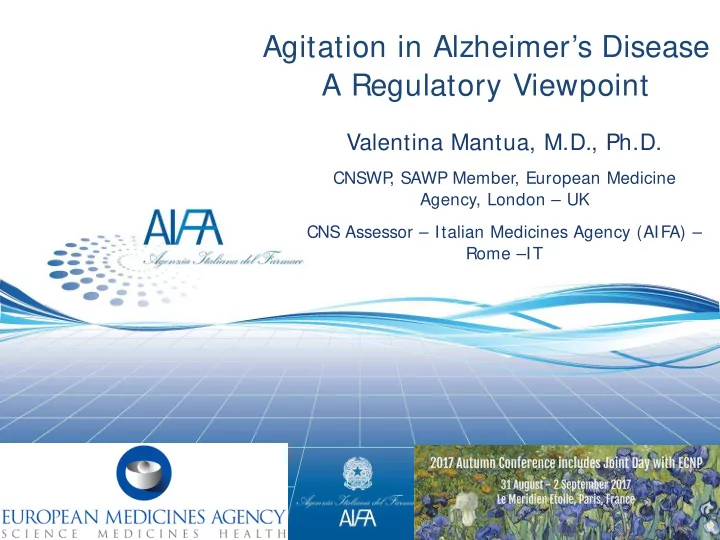

Agitation in Alzheimer’s Disease A Regulatory Viewpoint Valentina Mantua, M.D., Ph.D. CNSWP , SAWP Member, European Medicine Agency, London – UK CNS Assessor – Italian Medicines Agency (AIFA) – Rome –IT
Public Declaration of transparency/interests* More than 2 I nterests in pharmaceutical industry NO Currently Last 2 years years but less than 5 years ago Direct interests: Employment with a company x Consultancy for a company x Strategic advisory role for a company x Financial interests x Ownership of a patent x I ndirect interests: Principal investigator x Investigator x Individual ’ s Institution/Organisation receives a grant or other x funding * Valentina Mantua, in accordance with the updated policy on Conflict of Interest Regulations approved by AIFA Board of Directors (25.03.2015) and published on the Official Journal of 15.05.2015 according to 0044 EMA/513078/2010 on the handling of the conflicts of interest for scientific committee members and experts Note: For this talk, I am not receiving any compensation
The New Guidelines • Discussion Paper Oct 2014 • EMA workshop Nov 2014 • Scientific advices EMA • Scientific Advice-HTA Parallel • Literature • EMA Data Sharing Initiative • FDA Guidelines March 2015 • Overview of comments Jul 2016
Indications • Agitation in the context of AD is highly prevalent • Currently only Risperidone is licensed for short-term (6 weeks) treatment of persistent aggression • Antipsychotics are commonly used for the treatment of agitation in AD, despite the safety warning • Citalopram is also often prescribed in off-label setting • There is a high unmet need for the treatment of agitation • Treatment of Agitation in AD is a valid development goal
Clinical Trials Features • Double blind placebo controlled trial • Rating scales such as NPI/NPI-C or CMAI have been endorsed by regulatory authorities in registrational programs • Cognition and function as secondary endpoints (detrimental effect on cognition?) • Duration 8-12 weeks • Long term data on maintenance of efficacy, rebound/discontinuation phenomena and safety
Challenges • Heterogeneous definition/phenomenology of agitation • Agitation has to be persistent / the duration of TX effect too! • Medicines are investigated in a complex setting (multiple pharmacological/non-pharmacological interventions) • Placebo response • Statistical models should account for intercurrent events (specify handling of missing data and target estimation) • Safety (falls, detriment cognition, QTc prolungation)
Recommend
More recommend